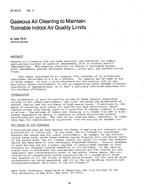Theoretically, the efficient operation of a refrigeration machine is very simple. Fig. 1 shows the temperature/entropy plot of the thermodynamic cycle that a chiller tries to implement. The external work which must be furnished to the system, transformation 4 – 5 (adiabatic compression), is a function of the temperature Tb for the condensation of the refrigerant. In turn, Tb is a function of the temperature of the vehicle used (e.g., the cooling tower water) to substract heat from the refrigerant for the condensation. The vehicle temperature must be lower than Tb. Thus, the lower the condenser water temperature, the shorter the compression phase, and therefore, less work has to be supplied from the “outside” to the system cycle.
In the past, because energy was inexpensive, there has generally been a lack of motivation to implement an elaborate chiller control system because of high installation costs. In addition, there are limitations encountered in applying such a simple concept. For example:
- A very low condenser water temperature usually requires more energy at the cooling tower level making it difficult to judge the energy balance.
- Low condensation refrigerant temperature can cause compressor surges resulting in downtime of the unites) due to safety tripping.
- Conventional protective control systems are inadequate
Citation: Symposium, ASHRAE Transactions, Volume 83, Part 1, Chicago, IL
Product Details
- Published:
- 1977
- Number of Pages:
- 9
- File Size:
- 1 file , 560 KB
- Product Code(s):
- D-CH-77-02-4


